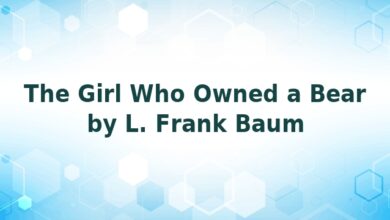
The Revolver by Arnold Bennett
When friends observed his occasional limp, Alderman Keats would say, with an air of false casualness, “Oh, a touch of the gout.”
And after a year or two, the limp having increased in frequency and become almost lameness, he would say, “My gout!”
He also acquired the use of the word “twinge.” A scowl of torture would pass across his face, and then he would murmur, “Twinge.”
He was proud of having the gout, “the rich man’s disease.” Alderman Keats had begun life in Hanbridge as a grocer’s assistant, a very simple person indeed. At forty-eight he was wealthy, and an alderman. It is something to be alderman of a town of sixty thousand inhabitants. It was at the age of forty-five that he had first consulted his doctor as to certain capricious pains, which the doctor had diagnosed as gout. The diagnosis had enchanted him, though he tried to hide his pleasure, pretending to be angry and depressed. It seemed to Alderman Keats a mark of distinction to be afflicted with the gout. Quite against the doctor’s orders he purchased a stock of port, and began to drink it steadily. He was determined that there should be no mistake about his gout; he was determined to have the gout properly and fully. Indulgence in port made him somewhat rubicund and “portly,”–he who had once been a pale little counter-jumper; and by means of shooting-coats, tight gaiters, and the right shape of hat he turned himself into a passable imitation of the fine old English gentleman. His tone altered, too, and instead of being uniformly diplomatic, it varied abruptly between a sort of Cheeryble philanthropy and a sort of Wellingtonian ferocity. During an attack of gout he was terrible in the house, and the oaths that he “rapped out” in the drawing-room could be heard in the kitchen and further. Nobody minded, however, for everyone shared in the glory of his gout, and cheerfully understood that a furious temper was inseparable from gout. Alderman Keats succeeded once in being genuinely laid up with gout. He then invited acquaintances to come and solace him in misfortune, and his acquaintances discovered him with one swathed leg horizontal on a chair in front of his arm-chair, and twinging and swearing like anything, in the very manner of an eighteenth-century squire. And even in that plight he would insist on a glass of port, “to cheat the doctor.”
He had two boys, aged sixteen and twelve, and he would allow both of them to drink wine in the evening, saying they must learn to “carry their liquor like gentlemen.” When the lad of twelve calmly ordered the new parlour-maid to bring him the maraschino, Alderman Keats thought that that was a great joke.
Quickly he developed into the acknowledged champion of all ancient English characteristics, customs, prejudices and ideals.
It was this habit of mind that led to the revolver.
He saw the revolver prominent in the window of Stetton’s, the pawnbroker in Crown Square, and the notion suddenly occurred to him that a fine old English gentleman could not be considered complete without a revolver. He bought the weapon, which Stetton guaranteed to be first-rate and fatal, and which was, in fact, pretty good. It seemed to the alderman bright, complex and heavy. He had imagined a revolver to be smaller and lighter; but then he had never handled an instrument more dangerous than a razor. He hesitated about going to his cousin’s, Joe Keats, the ironmonger; Joe Keats always laughed at him as if he were a farce; Joe would not be ceremonious, and could not be corrected because he was a relative and of equal age with the alderman. But he was obliged to go to Joe Keats, as Joe made a speciality of cartridges. In Hanbridge, people who wanted cartridges went as a matter of course to Joe’s. So Alderman Keats strolled with grand casualness into Joe’s, and said:
“I say, Joe, I want some cartridges.”
“What for?” the thin Joe asked.
“A barker,” the alderman replied, pleased with this word, and producing the revolver.
“Well,” said Joe, “you don’t mean to say you’re going about with that thing in your pocket, you?”
“Why not?”
“Oh! No reason why not! But you ought to be preceded by a chap with a red flag, you know, same as a steam-roller.”
And the alderman, ignoring this, remarked with curt haughtiness:
“Every man ought to have a revolver.”
Then he went to his tailor and had a right-hand hip-pocket put into all his breeches.
Soon afterwards, walking down Slippery Lane, near the Big Pits, notoriously a haunt of mischief, he had an encounter with a collier who was drunk enough to be insulting and sober enough to be dangerous. In relating the affair afterwards Alderman Keats said:
“Fortunately I had my revolver. And I soon whipped it out, I can tell you.”
“And are you really never without your revolver?” he was asked.
“Never!”
“And it’s always loaded?”
“Always! What’s the good of a revolver if it isn’t loaded?”
Thus he became known as the man who never went out without a loaded revolver in his pocket. The revolver indubitably impressed people; it seemed to match the gout. People grew to understand that evil-doers had better look out for themselves if they meant to disturb Alderman Keats, with his gout, and his revolver all ready to be whipped out.
One day Brindley, the architect from Bursley, who knew more about music than revolvers, called to advise the alderman concerning some projected alterations to his stabling–alterations not necessitated by the purchase of a motor-car, for motor-cars were not old English. And somehow, while they were in the stable-yard, the revolver got into the conversation, and Brindley said: “I should like to see you hit something. You’ll scarcely believe me, but I’ve never seen a revolver fired–not with shot in it, I mean.”
Alderman Keats smiled bluffly.
“I’ve been told it’s difficult enough to hit even a door with a revolver,” said Brindley.
“You see that keyhole,” said the alderman, startlingly, pointing to a worn rusty keyhole in the middle of the vast double-doors of the carriage-house.
Brindley admitted that he did see it.
The next moment there was an explosion, and the alderman glanced at the smoking revolver, blew on it suspiciously, and put it back into his celebrated hip-pocket.
Brindley, whom the explosion had intimidated, examined the double-doors, and found no mark.
“Where did you hit?” he inquired.
“Through the keyhole,” said the alderman, after a pause. He opened the doors, and showed half a load of straw in the dusk behind them.
“The bullet’s imbedded in there,” said he.
“Well,” said Brindley, “that’s not so bad, that isn’t.”
“There aren’t five men in the Five Towns who could do that,” the alderman said.
And as he said it he looked, with his legs spread apart, and his short-tailed coat, and his general bluff sturdiness, almost as old English as he could have desired to look. Except that his face had paled somewhat. Mr Brindley thought that that transient pallor had been caused by legitimate pride in high-class revolver-shooting. But he was wrong. It had been caused by simple fear. The facts of the matter were that Alderman Keats had never before dared to fire the revolver, and that the infernal noise and the jar on his hand (which had held the weapon too loosely) had given him what is known in the Five Towns as a fearful start. He had offered to shoot on the spur of the moment, without due reflection, and he had fired as a woman might have fired. It was a piece of the most heavenly good fortune that he had put the bullet through the keyhole. Indeed, at first he was inclined to believe that marksmanship must be less difficult than it was reported to be, for his aim had been entirely casual. In saying to Brindley, “You see that keyhole,” he had merely been boasting in a jocular style. However, when Brindley left, Brindley carried with him the alderman’s reputation as a perfect Wild West shot.
The alderman had it in mind to practise revolver-shooting seriously, until the Keats coachman made a discovery later in the day. The coachman slept over the carriage-house, and on going up the ladder to put on his celluloid collar he perceived a hole in his ceiling and some plaster on his bit of carpet. The window had been open all day. The alderman had not only failed to get the keyhole, he had not only failed to get the double-doors, he had failed to hit any part whatever of the ground floor!
And this unsettled the alderman. This proved to the alderman that the active use of a revolver incurred serious perils. It proved to him that nearly anything might happen with a revolver. He might aim at a lamp-post and hit the town hall clock; he might mark down a burglar and destroy the wife of his affections. There were no limits to what could occur. And so he resolved never to shoot any more. He would still carry the revolver; but for his old English gentlemanliness he would rely less on that than on the gout.
But the whole town (by which I mean the councillors and the leading manufacturers and tradesmen and their sons) had now an interest in the revolver, for Brindley, the architect, had spoken of that which he had seen with his own eyes. Some people accepted the alderman without demur as a great and terrible shot; but others talked about a fluke; and a very small minority mentioned that there was such a thing as blank cartridge. It was the monstrous slander of this minority that induced the alderman to stand up morally for his revolver and to continue talking about it. He suppressed the truth about the damaged ceiling; he deliberately allowed the public to go on believing, with Brindley, that he had aimed at the keyhole and really gone through it, and his conscience was not at all disturbed. But that wicked traducers should hint that he had been using blank cartridge made him furiously indignant, and also exacerbated his gout. And he called on his cousin Joe to prove that he had never spent a penny on blank cartridge.
It was a pity that he dragged the sardonic Joe back into the affair. Joe observed to him that for a man in regular revolver practice he was buying precious few cartridges; and so he had to lay in a stock. Now he dared not employ these cartridges; and yet he wished to make a noise with his revolver in order to convince the neighbourhood that he was in steady practice. Nor dare he buy blank cartridges from Joe. It was not safe to buy blank cartridges anywhere in the Five Towns, so easily does news travel there, and so easily are reputations blown. Hence it happened that Alderman Keats went as far as Crewe specially to buy blank cartridge, and he drowned the ball cartridge secretly in the Birches Pond. To such lengths may a timid man be driven in order to preserve and foster the renown of being a dog of the old sort. All kinds of persons used to hear the barking of the alderman’s revolver in his stable-yard, and the cumulative effect of these noises wore down calumny and incredulity. And, of course, having once begun to practise, the alderman could not decently cease. The absurd situation endured. And a coral reef of ball cartridges might have appeared on the surface of Birches Pond had it not been for the visit (at enormous expense) of Hagentodt’s ten tigers to the Hanbridge Empire.
This visit, epoch-making in the history of music-hall enterprise in the Five Towns, coincided with the annual venison feast of a society known as Ye Ancient Corporation of Hanbridge, which society had no connection whatever with the real rate-levying corporation, but was a piece of elaborate machinery for dinner-eating. Alderman Keats, naturally, was prominent in the affair of the venison feast. Nobody was better fitted than he to be in the chair at such a solemnity, and in the chair he was, and therein did wonderful things. In putting the loyal toasts he spoke for half an hour concerning the King’s diplomacy, with a reference to royal gout; which was at least unusual. And then, when the feast was far advanced, he uprose, ignoring the toast list, and called upon the assembled company to drink to Old England and Old Port for ever, and a fig for gout! And after this, amid a genial informality, the conversation of a knot of cronies at the Chair end of the table deviated to the noble art of self-defence, and so to revolvers. And the alderman, jolly but still aldermanic, produced his revolver, proving that it went even with his dress-suit.
“Look here,” said one. “Is it loaded?”
“Of course,” said the alderman.
“Ball cartridge?”
“Of course,” said the alderman.
“Well, would you mind putting it back in your pocket–with all this wine and whisky about–“
The alderman complied, proud.
He was limping goutily home with the Vice, at something after midnight, when, as they passed the stage-door of the Empire, both men were aware of fearsome sounds within the building. And the stage-door was ajar. Being personages of great importance, they entered into the interior gloom and collided with the watchman, who was rushing out.
“Is that you, Alderman Keats?” exclaimed the watchman. “Thank Heaven!”
The alderman then learnt that two of Hagentodt’s Bengal tigers were having an altercation about a lady, and that it looked like a duel to the death. (Yet one would have supposed that after two performances, at eight-thirty and ten-thirty respectively, those tigers would have been too tired and bored to quarrel about anything whatever.) The watchman had already fetched Hagentodt from his hotel, but Hagentodt’s revolver was missing–could not be found anywhere, and the rivals were in such a state of fury that even the unique Hagentodt would not enter their cage without a revolver. Meanwhile invaluable tigers were being mutually destructive, and the watchman was just off to the police-station to borrow a revolver.
The roaring grew terrific.
“Have you got your revolver, Alderman Keats?” asked the watchman.
“No,” said the alderman, “I haven’t.”
“Oh!” said the Vice. “I thought I saw you showing it to your cousin and some others.”
At the same moment Joe and some others, equally attracted by the roaring, strolled in.
The alderman hesitated.
“Yes, of course; I was forgetting.”
“If you’ll lend it to the professor a minute or so?” said the watchman.
The alderman pulled it out of his pocket, and hesitatingly handed it to the watchman, and the watchman was turning hurriedly away with it when the alderman said nervously:
“I’m not sure if it’s loaded.”
“Well, you’re a nice chap!” Joe Keats put in.
“I forget,” muttered the alderman.
“We’ll soon see,” said the watchman, who was accustomed to revolvers. And he opened it. “Yes,” glancing into it, “it’s loaded right enough.”
And turned away again towards the sound of the awful roaring.
“I say,” the alderman cried, “I’m afraid it’s only blank cartridge.”
He might have saved his reputation by allowing the unique Hagentodt to risk his life with a useless revolver. But he had a conscience. A clear conscience was his sole compensation as he faced the sardonic laughter which Joe led and which finished off his reputation as a dog of the old sort. The annoying thing was that his noble self-sacrifice was useless, for immediately afterwards the roaring ceased, Hagentodt having separated the combatants by means of a burning newspaper at the end of a stick. And the curious thing was that Alderman Keats never again mentioned his gout.





